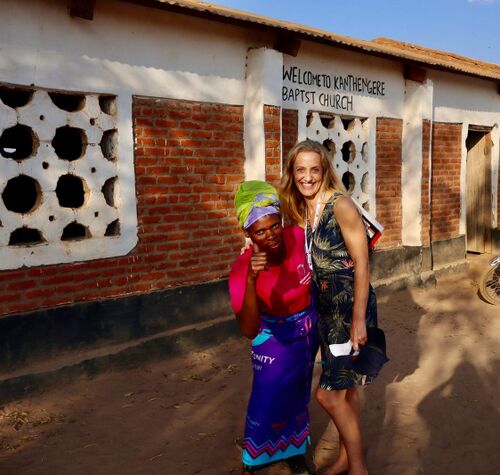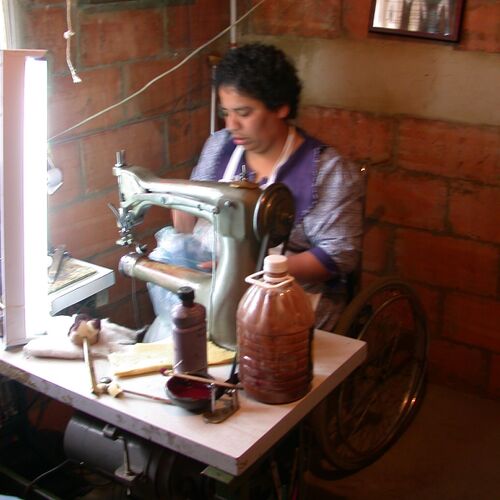
Deborah Foy has been a committed Opportunity International staff member for over 22 years. She has worked across numerous countries, continents and teams. After two decades of service, Deborah is moving on to start a new chapter, so we caught up with her to discuss her time with Opportunity, from starting as an intern in 2002 with the UK Office, to her current role as Executive Director to the Global Board.
What first attracted you to Opportunity International and kept you here for so long?
I connected to the mission – providing financial services, particularly credit, to the people who need it most. The focus on women also excited me. I love how we combine access to finance with the collaboration and solidarity of the local community to overcome challenges. We help bridge, make connections, boost mutual trust and solidarity through training, support and capacity building.
What really brought that home to me was my first trip as an intern meeting internally displaced victims of the civil war in Colombia. Typically, they found themselves in cities with nothing and trusted no one. Helping to bring neighbours together to support and learn from one another, and help each other out of poverty, was really powerful to me. That really struck me and has kept me here.
Reflecting on your time at Opportunity International, what has really stood out?
People say, “You’ve been with the organisation for 22 years, is it not just more of the same? Have you not got bored?” But for me, Opportunity never stands still. There have been so many challenges over the 22 years that I’ve been with the organisation, and there’s always more to do. The challenges are getting bigger, especially with climate change having such a significant impact on the lives and livelihoods of those we serve. Despite this, Opportunity continues to be able to adapt and reach those who need support most.
What client stories have stuck with you and why?
When I worked in the slums of Bagota, I met Yanill, a member of a group who had taken out a loan from Opportunity to invest in her shoemaking business. She was in a wheelchair and her street was a steep, bumpy hill. The only way she could get to the bottom of the hill to sell her shoes was to rely on people to carry her down in her wheelchair. But she found solidarity and community through her group. Meeting her and seeing her spirit of resilience was really inspiring. I’ve seen the value of community across Opportunity’s programmes.

Yanill in her shoemaking workshop.
What are the proudest achievements of the organisation that you’ve had a hand in?
I think I am proudest that we’ve never been afraid to take risks. It’s really important when you work in an organisation that relies on the generous support from donors. We have a responsibility to put that money to the best use and for me, that means doing things the private sector won’t do because it’s too risky.
For example, we know nearly one billion globally experience catastrophic out-of-pocket health spending. We also know that universal health coverage cannot be achieved by the public sector alone, in the face of the interlinked challenges of poverty, ill health and really limited health system capacity. At Opportunity, we’re currently looking to see what we can do to encourage private sector innovation in this space. How can we tap into the potential of financial inclusion for last mile health?
I also think what Opportunity has done well is really learning from its failures. We try not to link failure with fault because when you’re working at the frontier, lots of things are not going to work. For example, with our work in Malawi, we took four steps forward and six steps back because of Cyclone Freddy, one of the biggest tropical storms in decades. We just pick ourselves up, learn from that, and see what else we can do to achieve our mission.
What are some of your personal proudest achievements from your 22 years at Opportunity International?
One of the first initiatives I was involved with was our work in microinsurance. About 20 years ago, insurance for people living in poverty was not really heard of. Insurance is all about risk and these communities are so risky in so many different ways. We did a lot of monitoring and trial work with insurance in Malawi, but also credit life insurance that protects someone even if they have HIV AIDS, which 20 years ago was a really big deal, and you wouldn’t find many insurers covering those kinds of risks. So that was really exciting for me.
There is also our work trialing innovative technologies like biometric fingerprints. Helping a woman who previously never had access to a savings account, use her thumbprint to have a smart card that would enable her to take out cash from an ATM machine. It was completely transformative for these women. Imagine being a woman living in Malawi, in a remote community, having control of her funds, having never previously had that. These stories of women putting cash under a mattress or digging a hole near a tree, they’re true. So that was very inspiring to think that you could make a difference to families like that.
Why should people leave a legacy with Opportunity?
Opportunity will always put clients first and keep learning and changing to help those in need. And when one person is supported, whole families and communities can be lifted out of poverty; it really is a gift that keeps on giving. Some time ago, I found out that two women in my village donate to Opportunity. So I reached out to them and asked if I could talk to them about our work. Both openly discussed their legacies and it made me reflect on what a privilege it is for us to have the trust of a donor that they would give to us after their death. I think that trust between us, our donors and our clients is the essence of who we are as an organisation and why we’re here 50 years later.